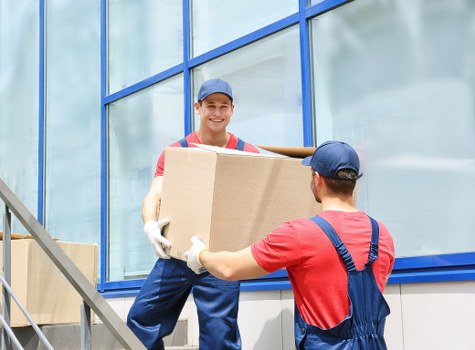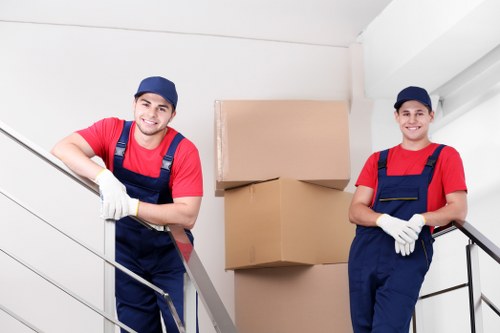Council Waste Collection in Purfleet

Maintaining a clean and sustainable environment is a priority for the residents of Purfleet. Council Waste Collection plays a crucial role in ensuring that waste is managed efficiently and responsibly. This article explores the various aspects of waste collection services in Purfleet, providing residents with the information they need to participate actively in keeping their community clean.
The council has implemented a comprehensive waste management system that caters to the needs of all households and businesses in Purfleet. From regular garbage collection to specialized recycling programs, the services are designed to minimize environmental impact and promote recycling and reuse.
Understanding how waste collection works in Purfleet can help residents make informed decisions about their waste disposal habits. This not only contributes to a cleaner environment but also supports the council's sustainability initiatives.
How Waste Collection Works in Purfleet

The waste collection process in Purfleet is organized and efficient, ensuring that all types of waste are handled appropriately. The council provides residents with different bins for general waste, recycling, and garden waste, making it easier to sort and dispose of waste correctly.
General waste, which includes non-recyclable items, is collected on a weekly basis. Recycling collection occurs every other week, encouraging residents to separate recyclable materials such as paper, plastics, and glass from their regular trash. Garden waste, including leaves and branches, is collected monthly to maintain green spaces in the community.
In addition to these regular collections, the council offers special waste collection services for bulky items and hazardous materials. Residents can schedule pickups for items that do not fit into standard bins, ensuring that all waste is disposed of safely and responsibly.
Types of Waste Collected

Council Waste Collection in Purfleet handles various types of waste, each requiring specific disposal methods. Understanding the different categories of waste can help residents sort their trash more effectively.
General Waste
General waste includes everyday items that cannot be recycled or composted. This category covers items like non-recyclable plastics, diapers, and certain types of packaging. Proper disposal of general waste is essential to prevent litter and maintain public hygiene.
Recyclable Materials
Recyclable materials such as paper, cardboard, plastics, metals, and glass are collected separately. The council encourages residents to clean and sort these materials before placing them in the designated recycling bins. Recycling helps reduce the amount of waste sent to landfills and conserves natural resources.
Garden Waste
Garden waste includes organic materials like leaves, grass clippings, and branches. Collecting garden waste helps keep public parks and green areas clean and prevents the overgrowth of vegetation, which can attract pests and create unsightly conditions.
Bulky Items
Bulky items such as furniture, appliances, and large electronics require special handling. The council provides scheduled pickups for these items to ensure they are disposed of correctly without causing inconvenience to residents or disrupting traffic.
Hazardous Waste
Hazardous waste includes materials that are dangerous to human health or the environment, such as chemicals, paints, and batteries. The council offers designated drop-off points and scheduled collections for hazardous waste to ensure they are managed safely.
Recycling Initiatives and Programs

Recycling is a cornerstone of waste management in Purfleet. The council has introduced several initiatives to promote recycling among residents, aiming to reduce the overall waste footprint of the community.
One of the key programs is the Recycle and Reuse Campaign, which educates residents about the benefits of recycling and provides practical tips on how to sort and prepare recyclable materials. Workshops and information sessions are regularly held to engage the community and address any questions or concerns.
The council also collaborates with local businesses and organizations to enhance recycling efforts. Partnerships with recycling centers and waste management companies ensure that collected materials are processed efficiently and reused wherever possible.
Electronic Waste Recycling
Electronic waste, or e-waste, poses significant environmental challenges if not disposed of properly. The council has established specific collection points for e-waste, making it easier for residents to recycle old electronics without harm to the environment.
Community Recycling Events
Regular community recycling events provide opportunities for residents to drop off items that are not collected through regular waste collection services. These events focus on items like textiles, household appliances, and hazardous materials, ensuring comprehensive recycling coverage.
Schedule and Collection Days

Understanding the waste collection schedule is essential for residents to manage their waste effectively. The council has established a clear and consistent schedule to ensure timely collection of all waste types.
General waste is collected every Monday, while recycling is collected every other Wednesday. Garden waste pickups are scheduled for the first Friday of each month. Bulk and hazardous waste collections are available upon request and can be scheduled through the council's online portal.
Residents receive notifications about any changes to the collection schedule, such as holiday adjustments or unforeseen delays. Staying informed about the waste collection schedule helps maintain a clean and orderly community.
Special Collection Services
For residents with special waste disposal needs, the council offers additional collection services. These include scheduled pickups for bulky items and hazardous materials, ensuring that all types of waste are managed safely and efficiently.
Tips for Effective Waste Management

Effective waste management starts with individual actions. By adopting simple practices, residents can contribute to a cleaner and more sustainable Purfleet.
- Sort Your Waste: Separate recyclables from general waste to ensure that recyclable materials are properly processed.
- Reduce Packaging: Choose products with minimal packaging to decrease the amount of waste generated.
- Reuse Items: Find new uses for old items instead of discarding them. Reusing extends the life of products and reduces waste.
- Compost Organic Waste: Composting garden waste and kitchen scraps can reduce the volume of waste and produce valuable soil for gardening.
- Participate in Recycling Programs: Engage in council recycling initiatives and attend community recycling events to maximize your recycling efforts.
Proper Disposal of Hazardous Materials
Hazardous materials require special handling to prevent environmental contamination. Residents should use designated collection points and follow the council's guidelines for disposing of hazardous waste safely.
Local Recycling Centers and Facilities

Purfleet is home to several recycling centers and facilities that support the council's waste management efforts. These centers provide residents with convenient locations to drop off recyclable and hazardous materials.
The main recycling center in Purfleet offers comprehensive services, including the processing of paper, plastics, glass, and metals. Additionally, specialized facilities handle electronic waste and hazardous materials, ensuring that all waste types are managed responsibly.
Accessible Locations
To make recycling accessible to all residents, recycling centers are strategically located throughout Purfleet and nearby areas. This allows residents to easily find a convenient drop-off point, reducing the need for long-distance travel and encouraging more people to participate in recycling.
Extended Hours and Services
Many recycling centers offer extended hours on weekends and evenings, accommodating the schedules of busy residents. Some centers also provide additional services, such as repair workshops and educational programs, to promote sustainable practices within the community.
Environmental Impact and Benefits

Council Waste Collection in Purfleet has a significant positive impact on the environment. By managing waste effectively, the council helps reduce pollution, conserve natural resources, and promote sustainability.
Recycling reduces the need for raw materials, lowering the environmental footprint of manufacturing processes. Proper waste management also minimizes landfill usage, decreasing greenhouse gas emissions and preventing soil and water contamination.
Reducing Carbon Footprint
Efficient waste collection and recycling processes contribute to lowering the community's carbon footprint. By recycling materials, the council decreases the energy required for producing new products, which in turn reduces carbon emissions.
Supporting Local Ecosystems
Proper waste management helps protect local ecosystems by preventing litter and reducing the risk of pollution. Clean streets and public spaces promote healthier living environments and support local wildlife.
Challenges and Solutions

Despite the success of waste collection services in Purfleet, challenges remain. The council continually seeks innovative solutions to address these issues and improve waste management practices.
One of the primary challenges is increasing the recycling rate among residents. To tackle this, the council has launched awareness campaigns and provided additional resources to make recycling more accessible and user-friendly.
Another challenge is managing the disposal of hazardous waste safely. The council addresses this by offering specialized collection services and collaborating with environmental agencies to ensure compliance with safety standards.
Adapting to Population Growth
As Purfleet grows, the demand for waste management services increases. The council is expanding its infrastructure and resources to accommodate the rising population, ensuring that all residents continue to receive reliable waste collection services.
Innovative Recycling Technologies
Embracing new recycling technologies can enhance the efficiency and effectiveness of waste management. The council is exploring advanced sorting and processing methods to improve recycling rates and reduce waste.
Nearby Areas and Their Waste Collection Services

Purfleet is surrounded by several nearby areas, each benefiting from the council's waste collection services. Understanding the waste management practices in these areas can provide a broader perspective on regional sustainability efforts.
- West Thurrock: Located just north of Purfleet, West Thurrock shares similar waste collection schedules and recycling programs.
- Stanford-le-Hope: To the east, Stanford-le-Hope offers comprehensive waste management services, including specialized recycling initiatives.
- Corringham: South of Purfleet, Corringham benefits from regular waste collections and community recycling events.
- Chesil Beach: Known for its natural beauty, Chesil Beach emphasizes eco-friendly waste disposal to preserve its environment.
- Tilbury: Adjacent to Purfleet, Tilbury has robust waste management systems, including electronic waste recycling.
- East Tilbury: East Tilbury complements Tilbury's services with additional resources for hazardous waste disposal.
- Frodingham: Frodingham maintains regular waste collection and participates in regional recycling programs.
- Belhus: Belhus offers efficient waste management services, focusing on reducing landfill usage.
- Leigh-on-Sea: A coastal area, Leigh-on-Sea emphasizes sustainable waste practices to protect its marine environment.
- Windsor: Windsor collaborates with neighboring areas to enhance waste collection efficiency and recycling rates.
- Ockendon: Ockendon provides specialized waste collection services, including bulky item pickups.
- South Ockendon: South Ockendon supports Purfleet with complementary waste management services and recycling programs.
- Grays: Grays has a well-established waste collection schedule, aligning with Purfleet's initiatives.
- Little Thurrock Isle: This area focuses on community-driven waste management efforts, encouraging resident participation.
Future Plans for Waste Collection in Purfleet

The council is committed to continuously improving waste collection services in Purfleet. Future plans include expanding recycling programs, integrating advanced waste processing technologies, and enhancing community engagement.
One of the key initiatives is the introduction of a zero-waste goal, aiming to eliminate landfill waste entirely through increased recycling, composting, and waste reduction strategies. This ambitious target aligns with global sustainability efforts and positions Purfleet as a leader in environmental stewardship.
Additionally, the council plans to invest in infrastructure upgrades, such as expanding recycling facilities and introducing automated waste sorting systems. These improvements will enhance the efficiency of waste collection and processing, reducing operational costs and environmental impact.
Community Involvement
Engaging the community is essential for the success of future waste management initiatives. The council will continue to organize educational programs, workshops, and public consultations to gather input and encourage active participation from residents.
Adopting Green Technologies
Embracing green technologies, such as electric waste collection vehicles and energy-efficient recycling processes, is part of the council's vision for a sustainable future. These technologies will reduce carbon emissions and operational costs, benefiting both the environment and the community.
FAQs about Council Waste Collection in Purfleet

1. How can I find out my waste collection schedule in Purfleet?
You can find your waste collection schedule by visiting the council's official website or contacting the waste management department directly. Additionally, residents receive a printed schedule via mail at the start of each year.
2. What items are not accepted in the recycling bins?
Items such as food waste, plastic bags, electronics, and hazardous materials are not accepted in the recycling bins. These items should be disposed of through designated collection points or special collection services.
3. How can I arrange for bulky item collection?
Bulky item collection can be arranged by contacting the council through their online portal or by phone. It's recommended to schedule pickups in advance to ensure timely and efficient service.
4. Are there any penalties for improper waste disposal in Purfleet?
Yes, improper waste disposal can result in fines or penalties as per the council's regulations. Residents are encouraged to follow waste sorting guidelines to avoid any violations.
5. What initiatives are in place to reduce waste in Purfleet?
The council has several initiatives aimed at reducing waste, including recycling programs, waste reduction campaigns, composting services, and partnerships with local organizations to promote sustainable practices.